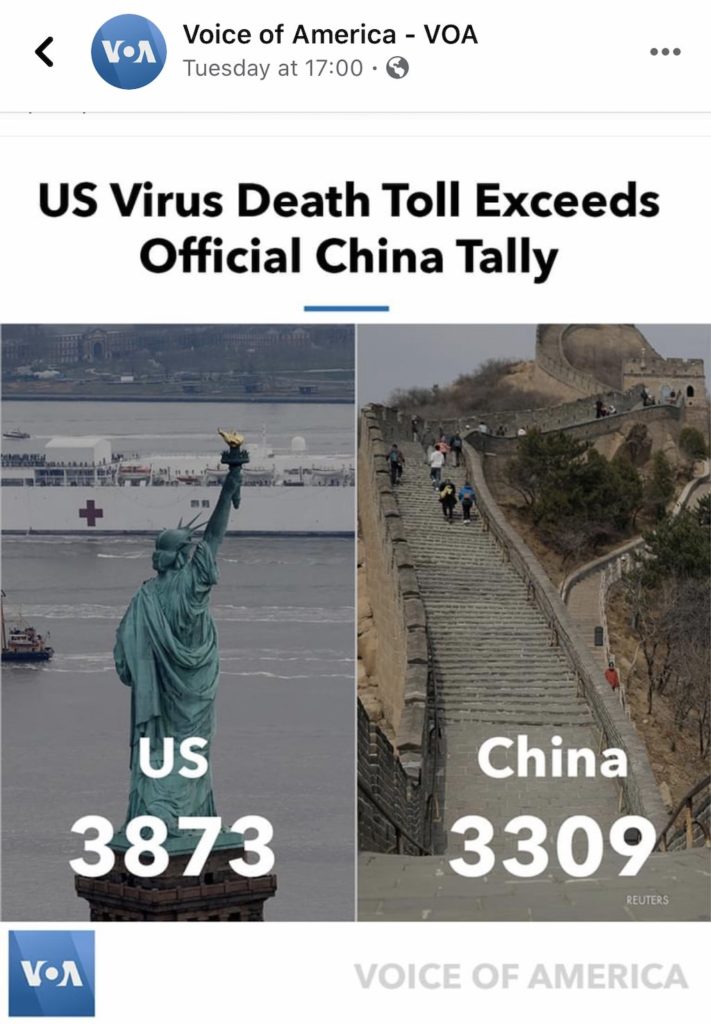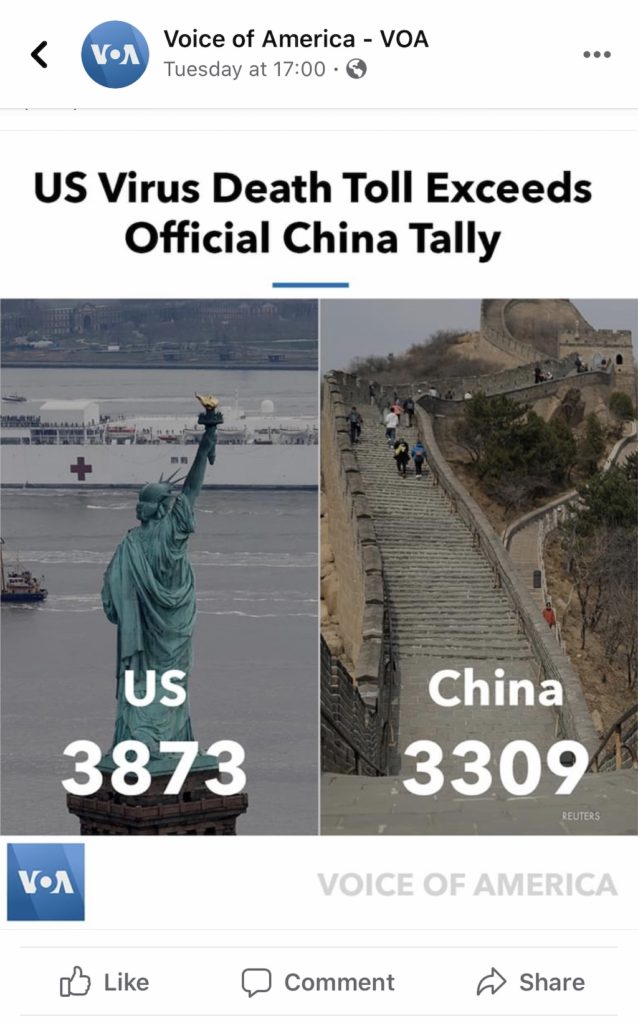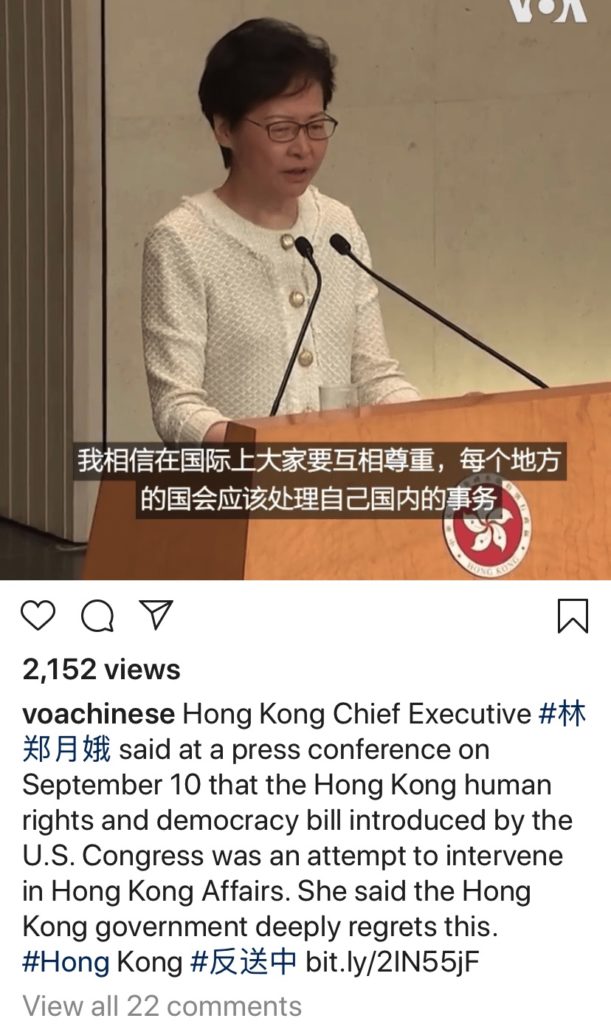USAGM WATCH COMMENTARY
The U.S. tax-funded, U.S. government-managed Voice of America (VOA) in the $800 million U.S. Agency for Global Media (USAGM) is not only accepting without questioning in some of its news reports and social media posts Chinese communist government’s COVID-19 statistics, but critics point out that under its current management VOA is also creating social media graphics and videos which help to spread and amplify Beijing’s propaganda and disinformation.
SEE: Steady Stream of Good China News Propaganda from Voice of America, USAGM Watch, March 30, 2020

Not all tax-supported media outlets reporting to the U.S. Agency for Global Media are being criticized on China coverage. Radio Free Asia (RFA), also under USAGM oversight, does the opposite of what VOA management has been doing in recent weeks and years.
RFA constantly challenges China’s official COVID-19 statistics and exposes Beijing’s propaganda in every news report. VOA often repeats Chinese propaganda without immediate questioning or providing balance, although from time to time, it posts information critical of the Chinese communist regime. Almost always, any criticism of Beijing in VOA programs is diluted and balanced with lengthy quotes from Chinese officials and other critics of the United States. At the same time, VOA does not always balance Chinese and other international criticism of the U.S. government.
VOA and RFA can’t both be right on China’s COVID-19 data and other China news.
At a recent USAGM Board meeting, Committee for U.S. International Broadcasting Executive Director Ann Noonan pointed out that the VOA Mandarin Service had posted tweets with official Chinese propaganda without any questioning or presenting at the same time even a hint of criticism of what Ms. Noonan described as Beijing’s disinformation in a VOA-produced content.
SEE: One-Sided Voice of America Tweets Help Spread China’s Message, USAGM Watch, March 8, 2020
SEE: Repeating Beijing Propaganda, Voice of America Still Gets Targeted by China, USAGM Watch, March 18, 2020
It is disturbing, to say the least, that outside experts and journalists have to point this out, and yet VOA still posts Chinese regime’s propaganda and, for an even greater impact, adds its own graphics in support of what many China experts agree are Beijing’s lies.
Voice of America director Amanda Bennett, who was appointed during the Obama administration, rejects criticism of her leadership. She has been touting VOA’s coronavirus coverage in a recently produced PR video. The video, according to agency sources, is being referenced by some U.S. media thanks to help provided by an outside PR firm, even though the Voice of America and the U.S. Agency for Global Media already have a large public relations office staffed with federal employees and contractors. In any case, according to critics, VOA and USAGM should not be targeting Americans using taxpayers’ money.
Not all of recent VOA Covid-19 coverage has been excellent. It is true that due to coronavirus pandemic, most VOA broadcasters have been forced to work from home under difficult conditions, but VOA has made mistakes not only on China. In early March, Serbian President Aleksandar Vučić in a nationwide television address harshly criticized the Voice of America for spreading false news about coronavirus deaths in Serbia. He specifically accused VOA of contributing to panic which interfered with the work of medical and emergency personnel and his own attempts and attempts of other Serbian officials to lead the response to the pandemic. In foreign policy, Vučić has been close to both Russia and China, which makes any mistakes by VOA more harmful to media freedom, democracy and other U.S. interests.
The VOA Serbian Service subsequently apologized for broadcasting false information. According to sources, the service relied on a single individual in Serbia without confirming accuracy of the information provided by this person. Sources also stressed to USAGM Watch that many VOA foreign language services have done a good job on Covid-19 coverage although the technical quality of programming produced from home is not what they would like it to be.
More on VOA China Controversy
VOA’s China coverage has been controversial for several years. In April 2017 Bennett ordered shortening of a VOA Mandarin Service exclusive interview with a Chinese whistleblower, businessman Guo Wengui, who offered to expose China’s influence buying and intelligence operations in the United States. Several VOA Mandarin Service journalists who wanted the interview to continue in full were either fired or disciplined. Bennett, whose husband is believed to have significant business interests in China, denied that she was acting under any pressure from Beijing and insisted that her programming decisions were only motivated by her desire to protect journalistic excellence and high standards.
A 2018 study by the Hoover Institution and Asia Society pointed out that “some VOA staffers interviewed for this report believe that China’s outreach campaign has succeeded in pushing the VOA Mandarin service away from programs with direct relevance to China toward programming that seeks instead to highlight American everyday life or teach American-style English to Chinese listeners.” “It is not surprising,” the report noted.
The Hoover Institution and Asia Society report also said that “VOA personalities have hosted events at the [Chinese] embassy [in Washington],” and one of VOA’s TV editors “even publicly pledged his allegiance to China at an embassy event.” The report cited “interview with VOA staff” as a source of this information.
SEE: Report of the Working Group on Chinese Influence Activities in the United States prepared by the Hoover Institution at Stanford University and the Center on US-China Relations at Asia Society in New York, October 2018
We attach texts of two recent VOA News reports for further reading and comparison.
US Now Leads World in Confirmed Coronavirus Cases
By VOA News
Updated March 27, 2020 04:27 AM
U.S. President Donald Trump posted on Twitter early Friday: “Just finished a very good conversation with President Xi of China. Discussed in great detail the Coronavirus that is ravaging large parts of our Planet. China has been through much & has developed a strong understanding of the Virus. We are working closely together. Much respect!”
The tone of this tweet is different from some of the president’s recent disparaging remarks about China in his press briefings where he often referred to the disease as “the Chinese virus.”
The United States now leads the world in the number of confirmed coronavirus cases, and Congress is on the verge of action to relieve the outbreak’s economic toll.
As of late Thursday, a count by Johns Hopkins Medical Center shows more than 85,000 cases in the United States, followed by China with more than 81,000 and Italy with about 80,500.
New York state is the epicenter of the U.S. outbreak, with New York City the hot spot. There were more 21,000 cases in the country’s largest city, with officials saying that number is growing by at least 3,000 a day.
On Friday, the U.S. House plans to pass the $2 trillion economic relief package that the Senate passed Wednesday night, and President Donald Trump has indicated he will sign it.
The centerpiece of the bill is direct cash payments to individuals who have lost their jobs and businesses forced to close their doors because of the outbreak.
Although the U.S. now has the largest number of cases, Trump said Thursday the government will be able to announce in the next two days what he calls good statistics and facts, “which will make your lives easier.”
He also plans to go to Norfolk, Virginia, to see the U.S. Navy hospital ship Comfort leave for deployment in New York Harbor.
A Reuters report says America’s home health care industry that can screen for the virus and that provides services to millions of the country’s most vulnerable residents is on the verge of collapse in the wake of the coronavirus.
Roger Noyes, a spokesman for New York’s Home Care Association told Reuters, “it’s a hair-on-fire crisis.”
The Reuters account said some caregivers are working without masks or gloves, while other workers have left their jobs and their patients.
Canada is balking at a U.S. proposal to deploy hundreds of Americans troops along the U.S.-Candian border, which is closed to help stop the spread of the coronavirus.
“Canada is strongly opposed to this U.S. proposal, and we have made that opposition very, very clear,” Deputy Prime Minister Chrystia Freeland said Thursday. “The public health situation does not require such action.”
In their first-ever remote vote, the EU Parliament members approved a $41 billion package of economic aid to members whose economies have also taken a beating because of the outbreak.
“From one day to the next, our lifestyles changed. Our streets emptied. Our doors closed. And we moved from a daily routine to the fight of our lives,” the head of the EU executive, Ursula von der Leyen, told the lawmakers. Nearly all of them were under lockdown across the 27-member bloc.
Italy and Spain have been particularly hard hit by the outbreak.
Elsewhere, a second U.S. soldier stationed in South Korea has tested positive for the coronavirus. Officials at Camp Humphrey said she is isolated as they clean all areas she was known to have visited. They are also trying to determine who else has been exposed.
China is temporarily closing its borders to all foreign visitors. Nearly all the new coronavirus cases in the past week in China have come from people arriving from overseas.
The outbreak appears to have eased in China, and authorities don’t want a resurgence.
South Africa and the Saudi cities of Riyadh, Medina and Mecca — the last are two of Islam’s holiest cities — are the latest to go under lockdown.
And the Associated Press reports U.N. ambassadors from eight countries under United States sanctions — China, Cuba, Iran, Nicaragua, North Korea, Russia, Syria, and Venezuela — are asking Secretary-General Antonio Guterres to press the U.S. to lift the sanctions so they can effectively fight the outbreak. The ambassadors accused the U.S. of politicizing the pandemic.
VOA News
Banning Travelers From China Won’t Stop Virus, Experts Warn
February 3, 2020 09:13 PM
[PHOTO]FILE PHOTO: Passengers wearing masks, amid the health threat of novel coronavirus, arrive on a direct flight from China at Chicago’s O’Hare airport in Chicago, Illinois, U.S., January 24, 2020. REUTERS/Kamil Krzaczynski/File Photo
The Trump administration’s unprecedented move to bar entry to foreigners coming from China won’t stop the new coronavirus from entering the United States, experts say, and it may do more harm than good.
While the United States is following several countries in trying to wall itself off from the virus that has killed more than 400 people, scientists say travel bans are unlikely to work and impose serious logistical and economic problems.
“You quickly see that we are on a slope that we’re not sure how to get off,” said epidemiologist Jennifer Nuzzo with the Johns Hopkins Center for Health Security, “the benefits of which are very much uncertain. Whereas the known harms are potentially quite certain.”
The presidential proclamation issued January 31 suspends entry for foreign nationals who have visited China in the 14 days before arriving in the United States.
“We made an aggressive decision in front of an unprecedented threat,” said Nancy Messonnier, director of the National Center for Immunization and Respiratory Diseases at the U.S. Centers for Disease Control and Prevention, at a press briefing Monday.
Messonnier noted that the case count had shot up from 41 to 17,000 in a matter of weeks.
“That is 17,000 cases with a novel coronavirus that the population doesn’t have immunity to,” she added, and for which health officials don’t have all the information they want.
[PHOTO]Passengers on the tram wear face masks in hopes to prevent contracting the spreading coronavirus in Hong Kong, Monday, Feb, 3,…
The virus is spreading rapidly across China, she added. Cases outside China are increasing, including person-to-person spread to patients who have not traveled to Wuhan, where the outbreak was first reported.
“Strong measures now may blunt the impact of this virus on the United States,” Messonnier said.
‘No reason’ for ban
But the World Health Organization disapproves.
“There is no reason for measures that unnecessarily interfere with international travel and trade,” WHO Director-General Tedros Adhanom Ghebreyesus told the organization’s executive board on January 30, the day before the Trump administration announced the travel ban.
China criticized the United States for having “unceasingly manufactured and spread panic,” and for “imposing excessive restrictions contrary to WHO recommendations,” said Foreign Ministry spokeswoman Hua Chunying.
It’s not an easy balance for health officials to strike, said University of North Carolina-Chapel Hill epidemiology professor Lisa Gralinski.
“Are we having a reasoned response that’s justified by the data? Are we also protecting our population from, in this case, a virus that we still know fairly little about?” she said.
However, she added, “we don’t have a lot of great data saying that these measures are very effective.”
Restrictions that some countries imposed during the severe acute respiratory syndrome outbreak in 2003 and the H1N1 influenza pandemic in 2009 did little to slow the spread of those diseases.
And China’s severe restrictions on travel within and out of Wuhan and several other cities have not stopped the new coronavirus outbreak from spreading across the country.
Already here
Stopping a contagious respiratory virus at the border is just very hard to do, experts say.
[PHOTO]LOS ANGELES, CA – FEBRUARY 02: Travelers arrive to LAX Tom Bradley International Terminal wearing medical masks for protection…
Travelers arrive at LAX Tom Bradley International Terminal wearing medical masks for protection against the novel coronavirus outbreak, Feb. 2, 2020, in Los Angeles.
“It is true that the fewer people who potentially carry the virus who come into an area, the less likelihood of further spread,” said Emory University public health and law professor Polly Price, “but, of course, we already know it’s in the United States.”
Health officials have identified 11 cases so far, and the CDC expects more.
And barring foreigners from entering the United States won’t stop the virus because U.S. citizens are no less likely to carry it, she noted.
Though China has the most cases by far, it is just one of 24 countries that have reported infections, and scientists say the virus had likely been spreading for weeks before the Wuhan outbreak was reported.
“There’s still the very real possibility that there are many more cases out there, and we don’t have a great sense of where they are in the world,” Nuzzo at Johns Hopkins said.
“It makes it difficult to prevent the introduction of cases if you don’t have a great sense of where all the cases are,” she added.
As the number of infected countries increases, she added, “will we then prevent travelers from those other countries that are reporting cases?”
Afghan health workers wearing protective gear speak with passengers who arrived from China during a screening process for…
Afghan health workers wearing protective gear speak with passengers who arrived from China during a screening process for coronavirus, at the Hamid Karzai International Airport in Kabul, Afghanistan, Feb. 3, 2020.
Negative consequences
The travel ban can ultimately hurt the effort to fight the disease, experts say.
If reporting infections means a country’s citizens will be locked out of the United States, that country may decide not to report infections, making it much harder to contain the outbreak.
“There’s concern that punitive measures send a bad signal to the rest of the world that may have a chilling effect on transparency,” Nuzzo said.
Scientists need all the data they can get from China to better understand how the virus spreads and how likely patients are to die from it, she added. That information affects how public health officials work to contain it and limit the impact on the most vulnerable.
Not to mention the fact that China manufactures many of the medicines and protective gear that the world needs to combat the outbreak.
“We can’t isolate ourselves from China without doing harm to ourselves,” she said.






1 comment
VOA late to update numbers. this story is linked on the front page
https://www.voanews.com/science-health/coronavirus-outbreak/82000-covid-19-deaths-projected-us-early-august
Comments are closed.